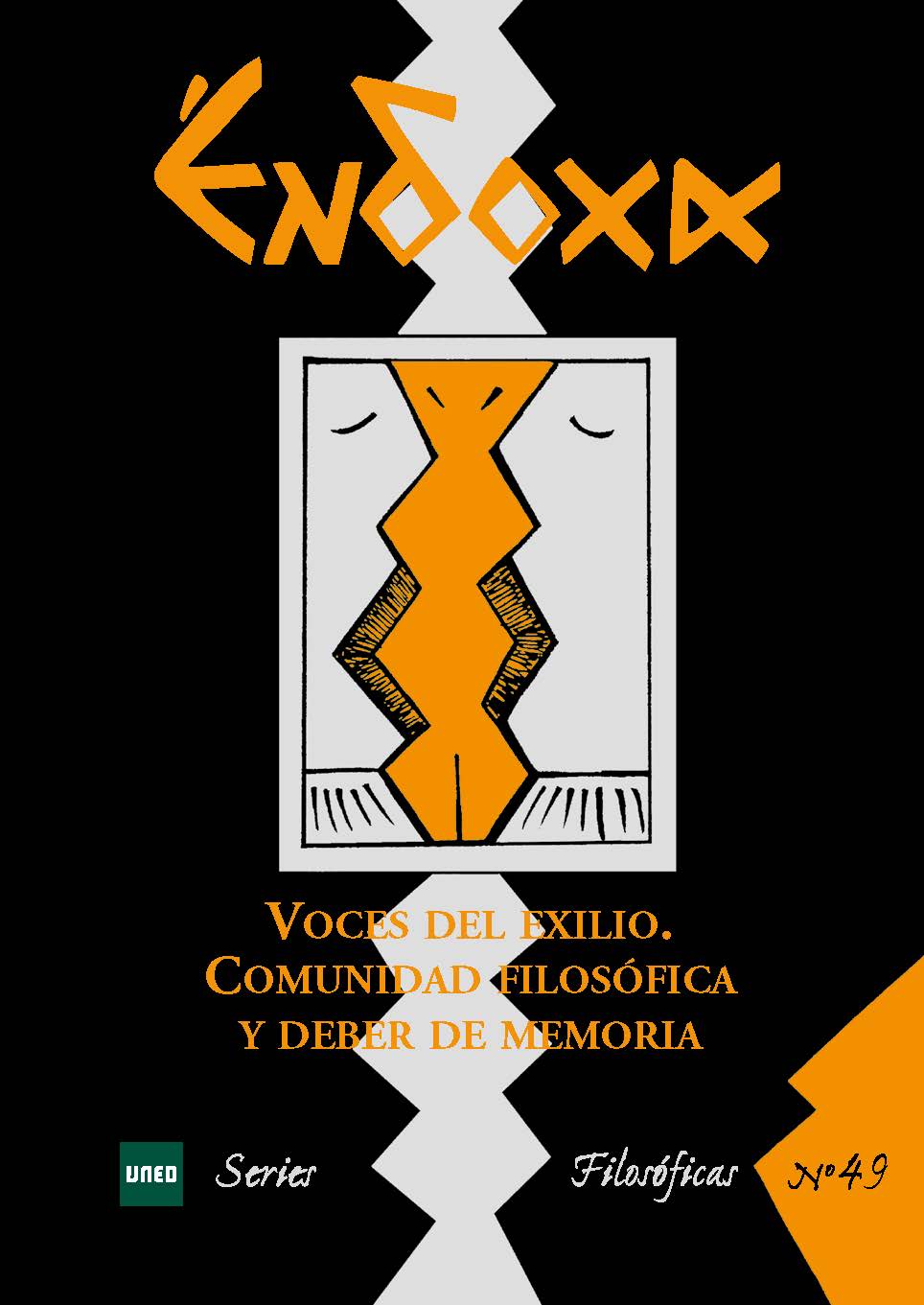El humus trágico de la "Escuela de Madrid"
Ortega y sus efectos sobre la razón poética en Zambrano y la gigantomaquía de la historia en Gaos
DOI:
https://doi.org/10.5944/endoxa.49.2022.25635Palabras clave:
<Humus> trágico, Ficción, Vida, Razón Poética, Gigantomaquia, Ortega, Zambrano, Gaos, Hayden White.Resumen
El presente trabajo procura analizar brevemente el concepto de “humus” trágico que supo transmitir Ortega –conscientemente o no-, a su discipulado, durante la conocida Escuela de Madrid. Para ello, y en segundo lugar, sostenemos que se puede desvelar este “humus” orteguiano desde las ideas de Hayden White. En tercer lugar, proponemos cómo se desplegaron dichas ideas orteguianas en María Zambrano y en José Gaos, y sostenemos que lo hicieron desde sus concepciones sobre la razón poética y cierta gigantomaquia de la historia –respectivamente-, las cuales no sólo reflejaron fielmente dichas ideas sino que, además, dieron un paso más allá de la propuesta orteguiana. Finamente, intentaremos poner en evidencia cuáles son las características zambranianas y gaosianas de dicha concepción trágica de la filosofía, las cuales irán mucho más allá del racionalismo europeo tradicionalista.Descargas
Citas
GAOS, José (1990). Obras Completas, Tomo VI. México: Universidad Nacional Autónoma de México.
ORTEGA Y GASSET, José (2017). Obras Completas, Tomo I. Madrid: Taurus, 2017.
— (2017). Obras Completas, Tomo IV. Madrid: Taurus, 2017.
REYES CELEDÓN, Esteban (2015). “Las múltiples ideas del teatro de Ortega y Gasset”. Diálogos transatlánticos. Memorias Congreso Internacional Literatura y Cultural españolas contemporáneas. Volumen II. Teatro: dramaturgia, representación y espectáculo. Ed. Natalia Corbellini, La Plata: Universidad Nacional de La Plata, 2014, pp.1-5. Web: http://www.memoria.fahce.unlp.edu.ar/library?a=d&c=eventos&d=Jev7417
ZAMBRANO, María (2000). Pensamiento y poesía en la vida española. Madrid: Endymión, 1996.
— (2000). Hacia un saber sobre el alma. Madrid: Alianza, 2000.
WHITE, Hayden (1992). Metahistoria. La imaginación histórica en la Europa del siglo XIX. México: Fondo Cultural Económico, 1992.
Publicado
Versiones
- 27-06-2022 (2)
- 27-06-2022 (1)
Cómo citar
Número
Sección
Licencia
Derechos de autor 2022 ENDOXA

Esta obra está bajo una licencia internacional Creative Commons Atribución-NoComercial-SinDerivadas 4.0.
Los autores que publican en esta revista están de acuerdo con los siguientes términos:
1. Los autores ceden de forma no exclusiva los derechos de explotación de los trabajos aceptados para su publicación a Éndoxa, garantizan a la revista el derecho de ser la primera publicación del trabajo y permiten que la revista distribuya los trabajos publicados bajo la licencia de uso indicada en el punto 2.
2. Las obras se publican en la edición electrónica de la revista bajo una licencia Creative Commons Reconocimiento-SinObraDerivada 4.0 . Se pueden copiar, usar, difundir, transmitir y exponer públicamente, siempre que: i) se cite la autoría y la fuente original de su publicación (revista, editorial y URL de la obra); ii) se mencione la existencia y especificaciones de esta licencia de uso.
3. Condiciones de auto-archivo. Se permite y se anima a los autores a difundir electrónicamente la versión post-print (versión evaluada y aceptada para su publicación) de sus obras antes de su publicación, siempre con referencia a su publicación en Éndoxa, ya que favorece su circulación y difusión más temprana y con ello un posible aumento en su citación y alcance entre la comunidad académica. Color RoMEO: verde.








